Frostpank: disassemble mechanics
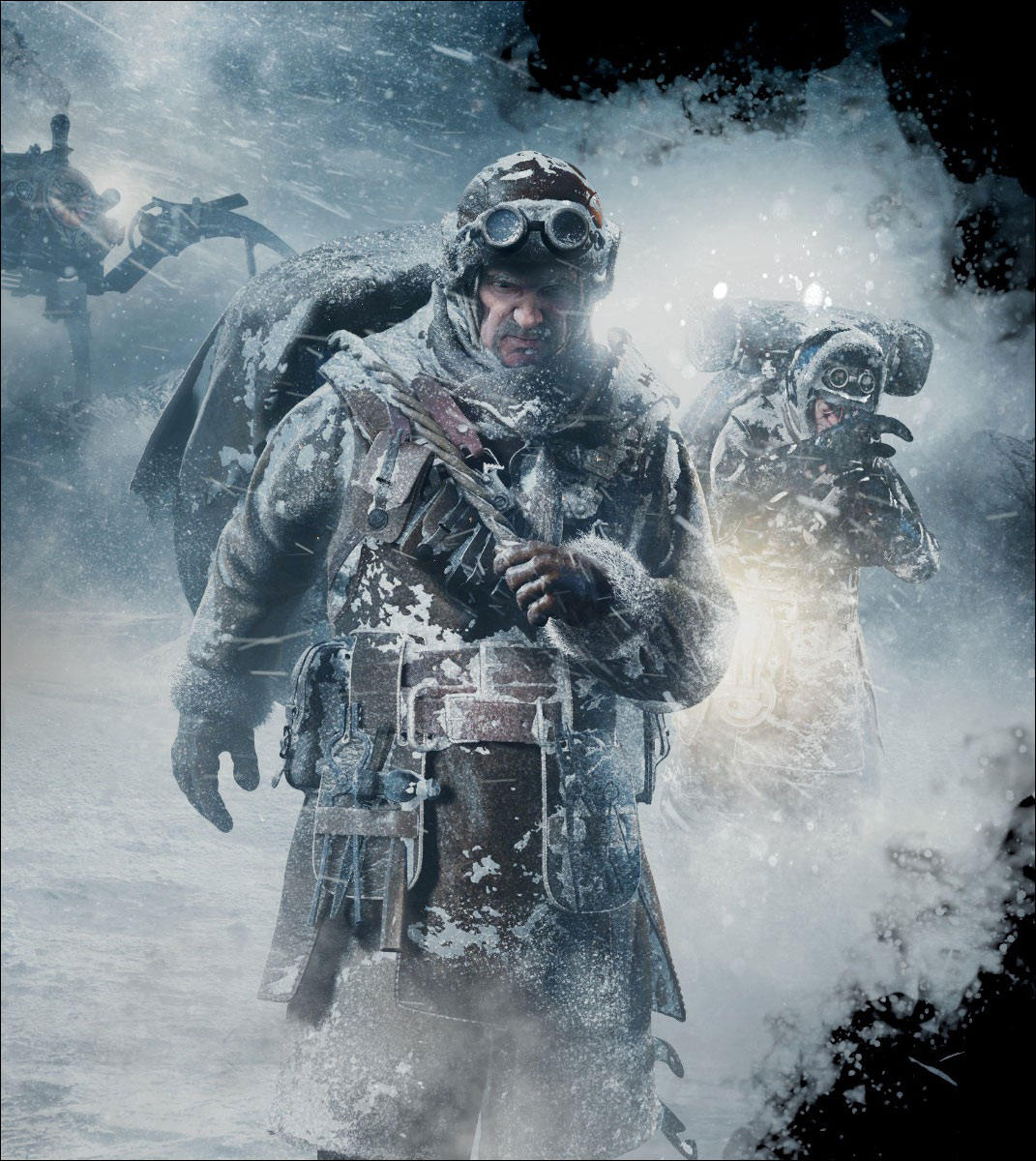
The creators of This War of Mine made another Slavic game with the intriguing name Frostpunk. That is steampunk in the Arctic. The plot is as follows: 1886, global climate change, winter has gone from the equator and swallowed up all the cities of the world. Britain foresaw this and sent several expeditions north in huge dreadnought machines. Life is only possible around coal-fired generators.
Your task is to build the last city on earth.
The main question is how far are you ready to go so that your people can survive. For example, can corpses be used for fertilizer in greenhouses? If a generator breaks down, you need to sacrifice valuable resources or, maybe, send it in through a small hole of a child? Does violence apply if someone bothers the city? Risk life scouts for the sake of resources?
The game has excellent igromekhanicheskie solutions and obvious fakapy that will not make the mechanics popular. Let's figure it out.
Below there are several spoilers, incl. in the screenshots, but they are not very critical
To begin with, look at the introductory trailer, it is beautiful:
The game in general, from the very first moments, is captivating just insanely cool aesthetics in everything: starting from the magic art and ending with this voice acting. Notice how smartly they emphasize words with music.
In the center of the city there is a generator, which must be heated with coal. Around it there is a small thermal zone in which it is necessary to build houses, a kitchen, sanitary points and so on. Far at the edges of the resources where you need to build mining buildings. Each building needs workers and heat (so that workers do not hurt).
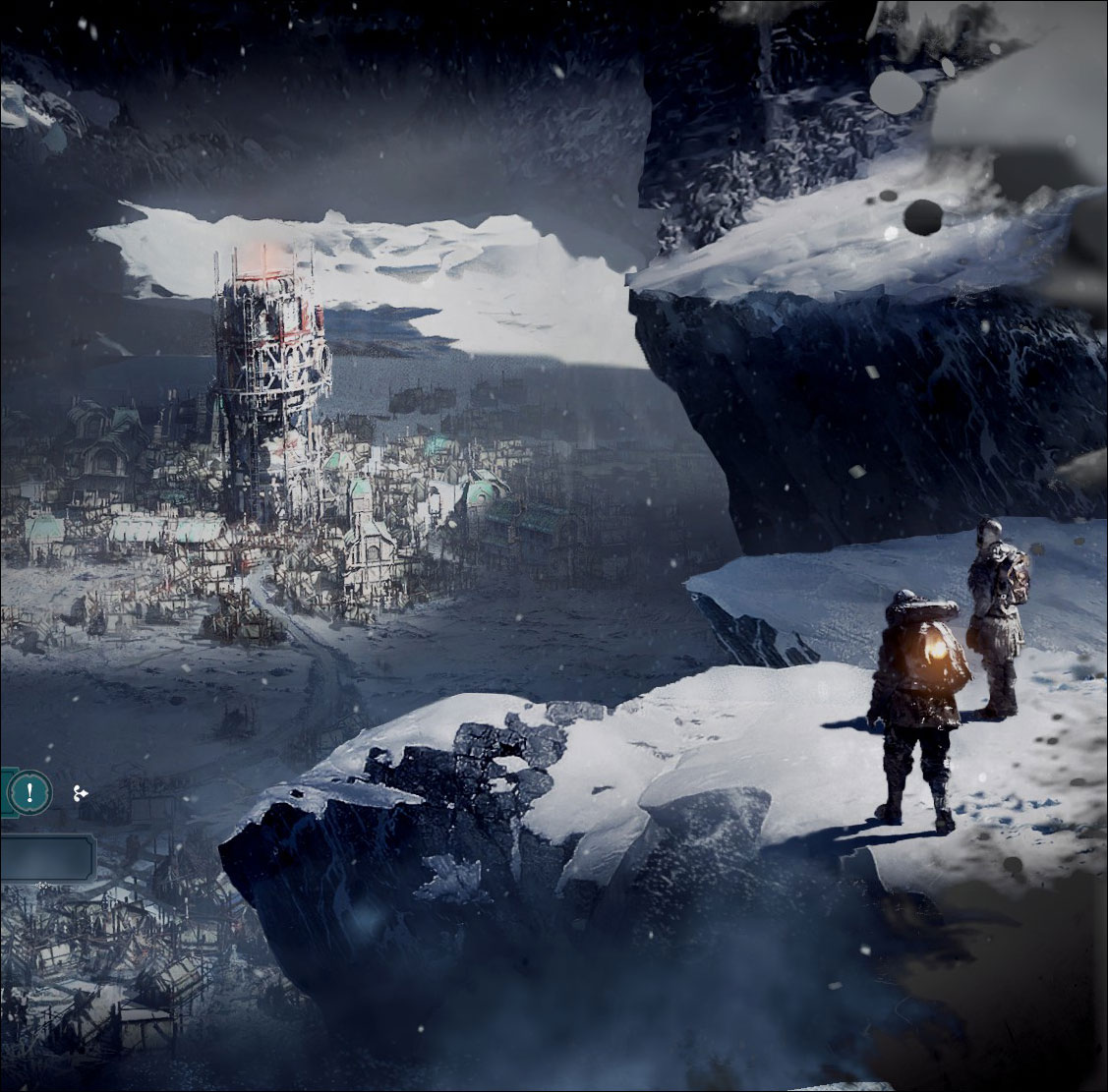
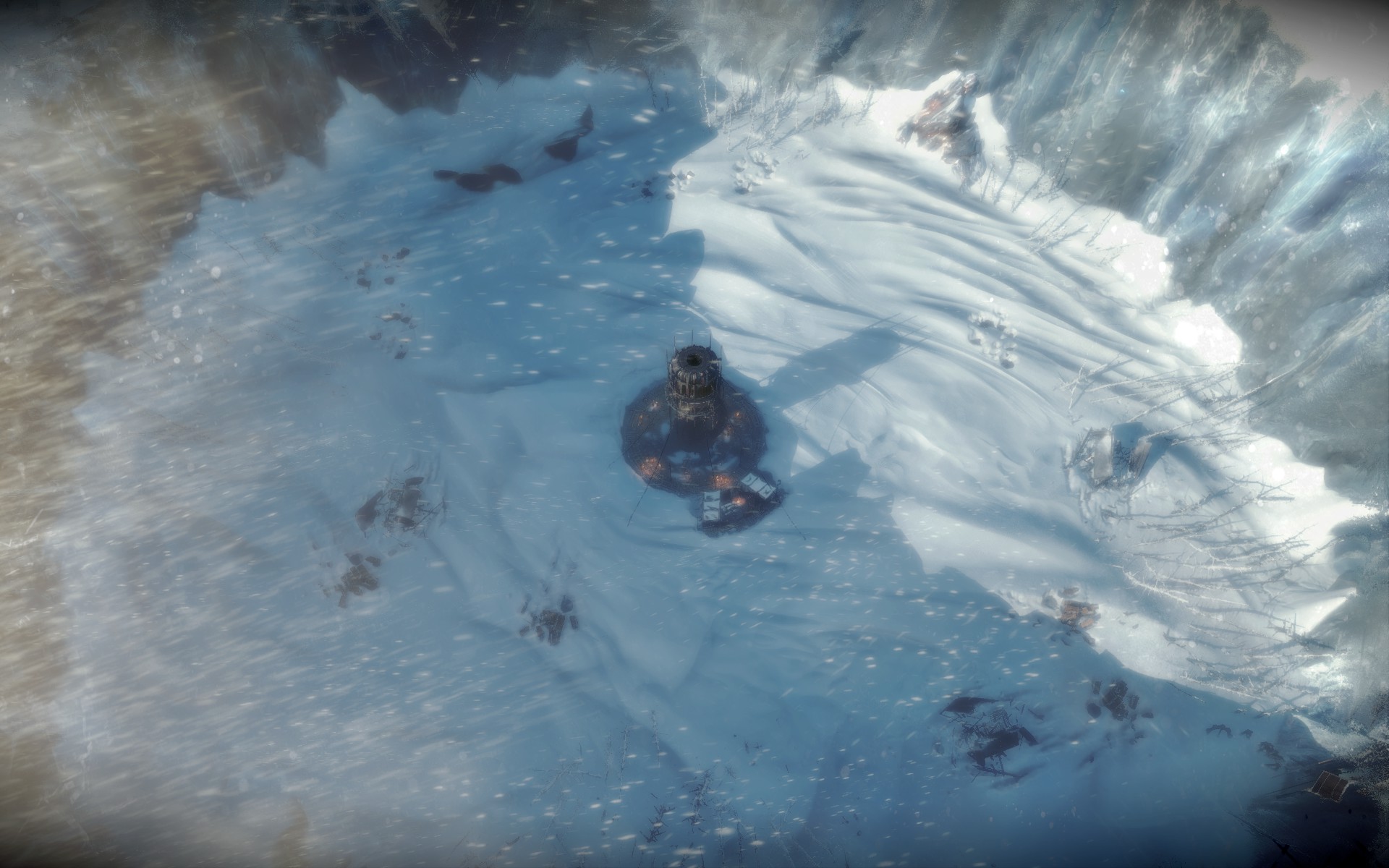

The playing field is round, it's very cool. Since it is necessary to press the building to the generator, building goes belts.
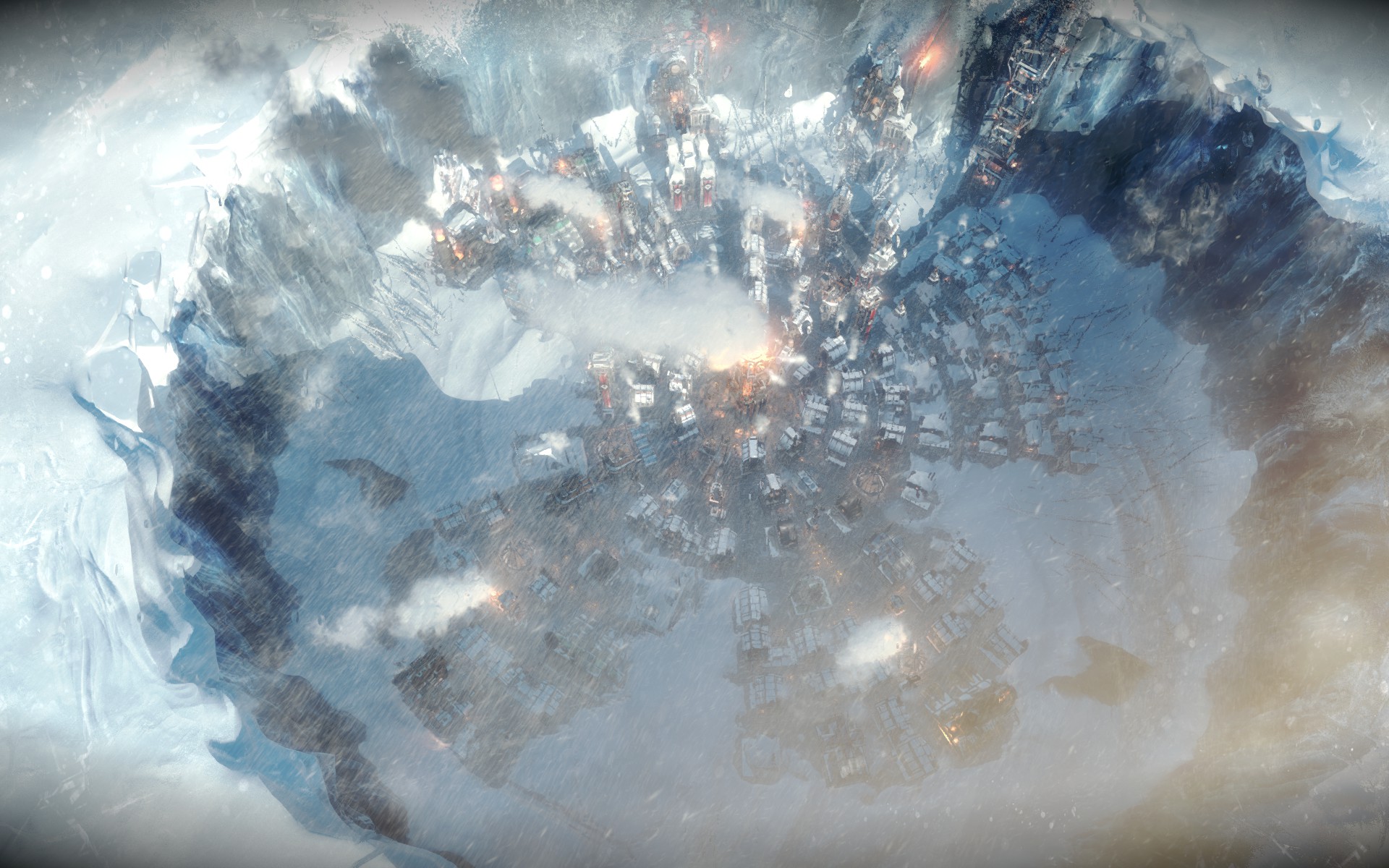
The problem is that the temperature from some -20 degrees Celsius by the end of the game will fall somewhere to -80. That is, all the time you need to explore technologies that allow you to increase the efficiency of the generator. In this case, you need to simultaneously extract resources, and you need to explore and production branches. That is, the whole game is a race between how you maintain the city in a critical condition, but you mine coal, wood, steel and food.
There are steam cores. They do not allow the city to become completely closed and self-sufficient during development. These are some focal points of steam power, which in the world of Frostpank can only be found, but not created. There is always a choice: to build up a large area with inefficient buildings and catch a lot of labor there, or to properly dispose of the cores.
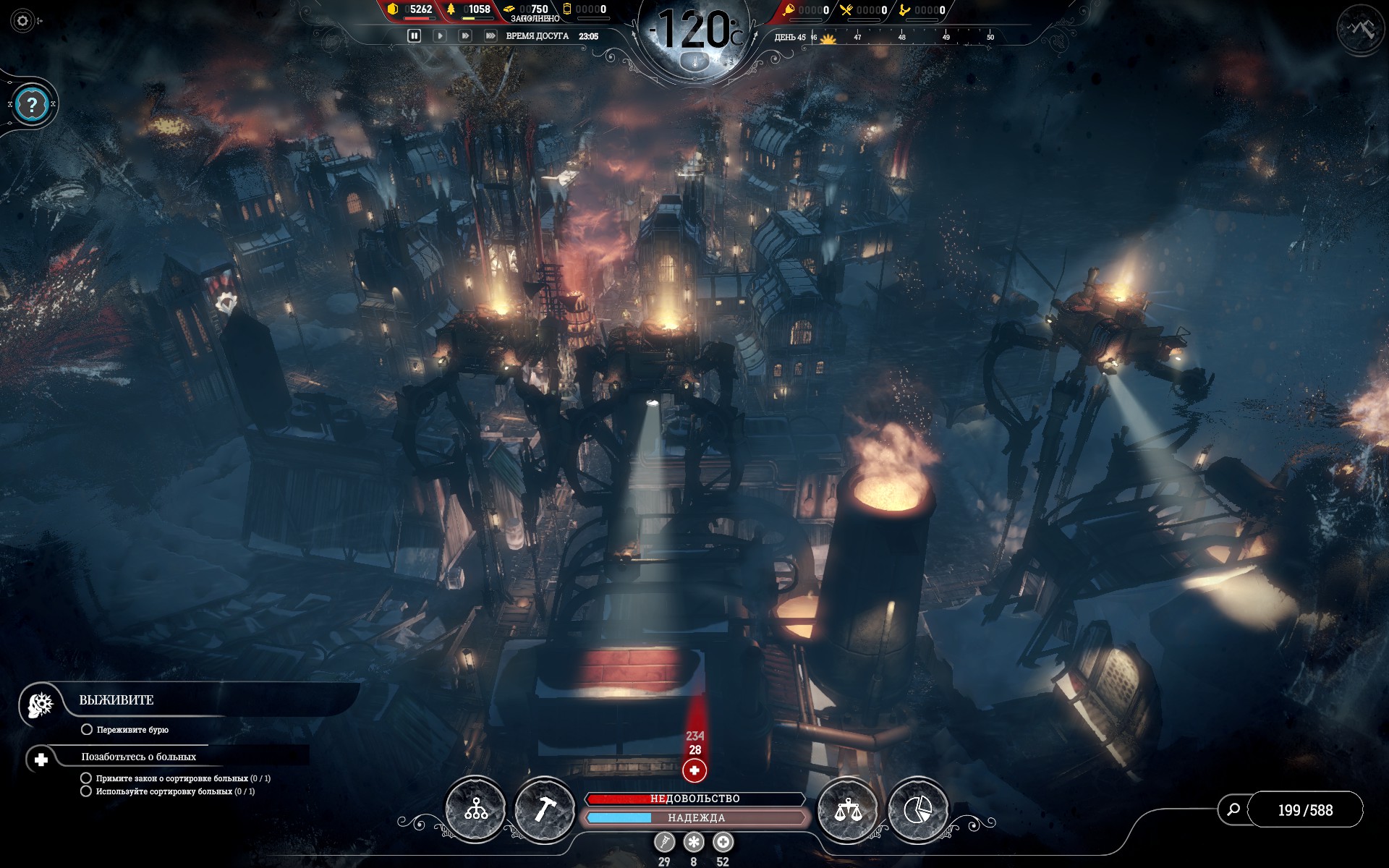
For example, build several automata
You start with the generator turned off, a handful of people and resources lying around.
Then every game day you will make important decisions in the economy and socially. There are two scales in the city: dissatisfaction with your actions and hope. Discontent rises when you enter 14-hour work shifts, make unpopular effective decisions, and move away from the habits of the civilized world. Hope grows when it becomes obvious to the public that something good has been done.
There are two branches of science: in fact, research and laws.

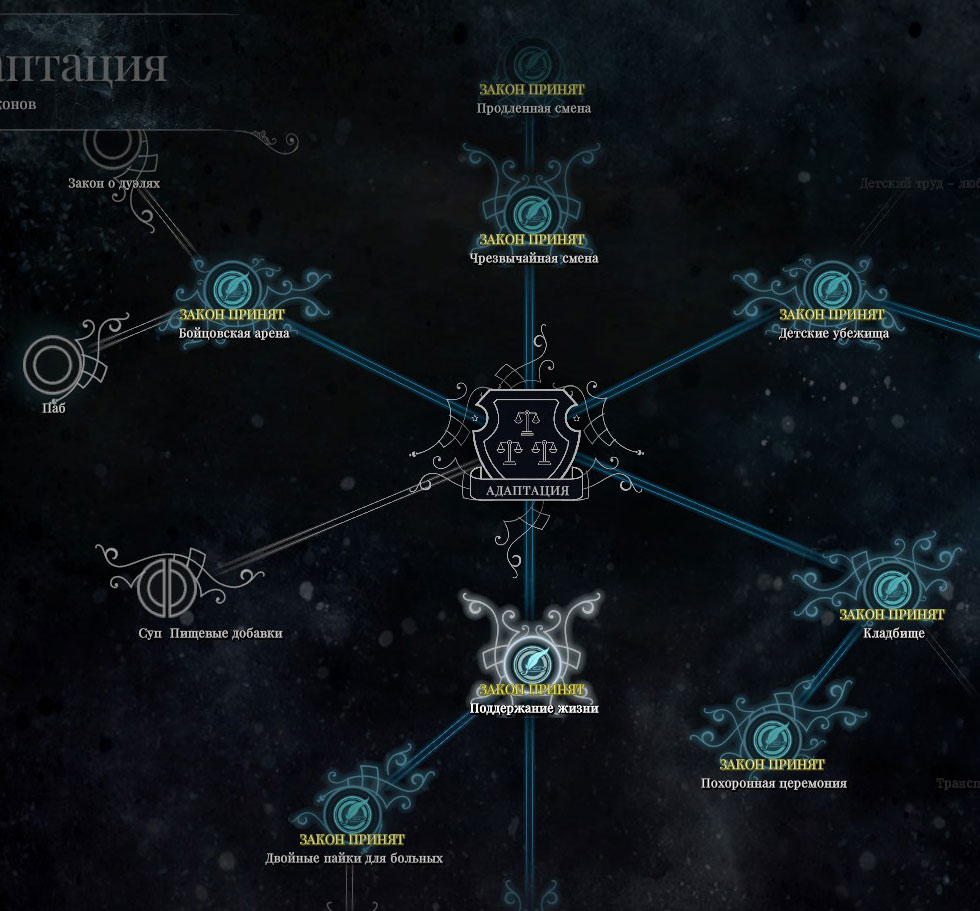
Laws- this is how you change the rules of the game in a new world. For example, what to do with corpses: bury or store for future reuse as fertilizer or in medicine? How to keep order: an iron communist discipline or going to religion? Children in the city: use them in the workplace or build kindergartens? What to do with patients in a critical situation - to treat everyone or to accentuate those who are easily cured, but at the same time letting some of the heavy die? Is it worth it to build a prison, is it worth declaring oneself a divine voice, is it worth punishing heretics or building guard posts and a propaganda center? Should I allow duels, build a brothel, pour alcohol in the soup?
Almost every choice is reflected in the scales of hope and discontent. The peculiarity of the laws - although they improve the condition of the city, but about 3/4 of them show the bottom for the bottom, which you pierce. For “clean” scenarios, it is extremely important to stop on time and not to accept the most effective from the point of view of the economic model, but not the best social things.
Another city gives you elections in two important parts: when something happens in the settlement itself, or when your intelligence officers meet something on the world map. Usually questions like this:
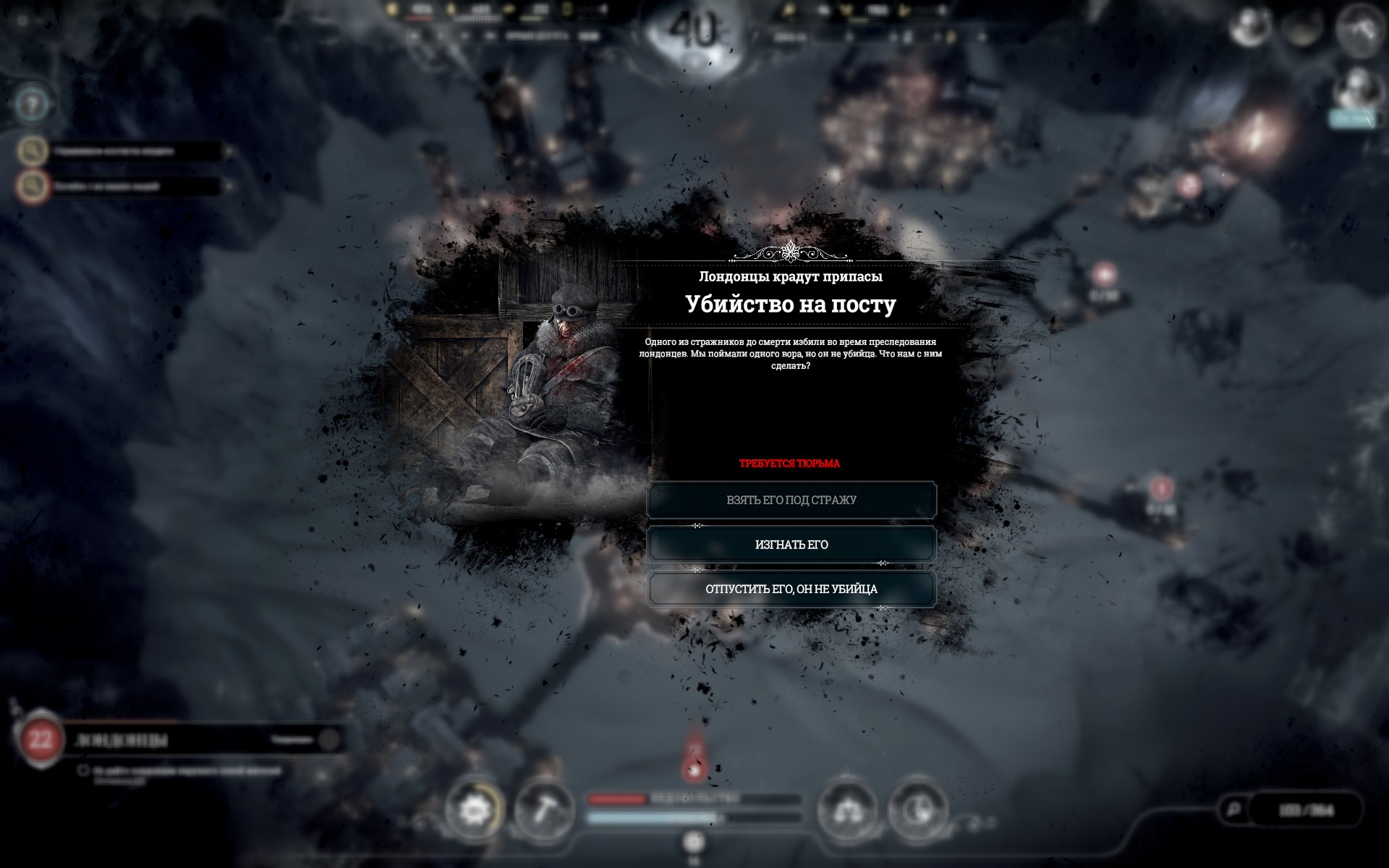
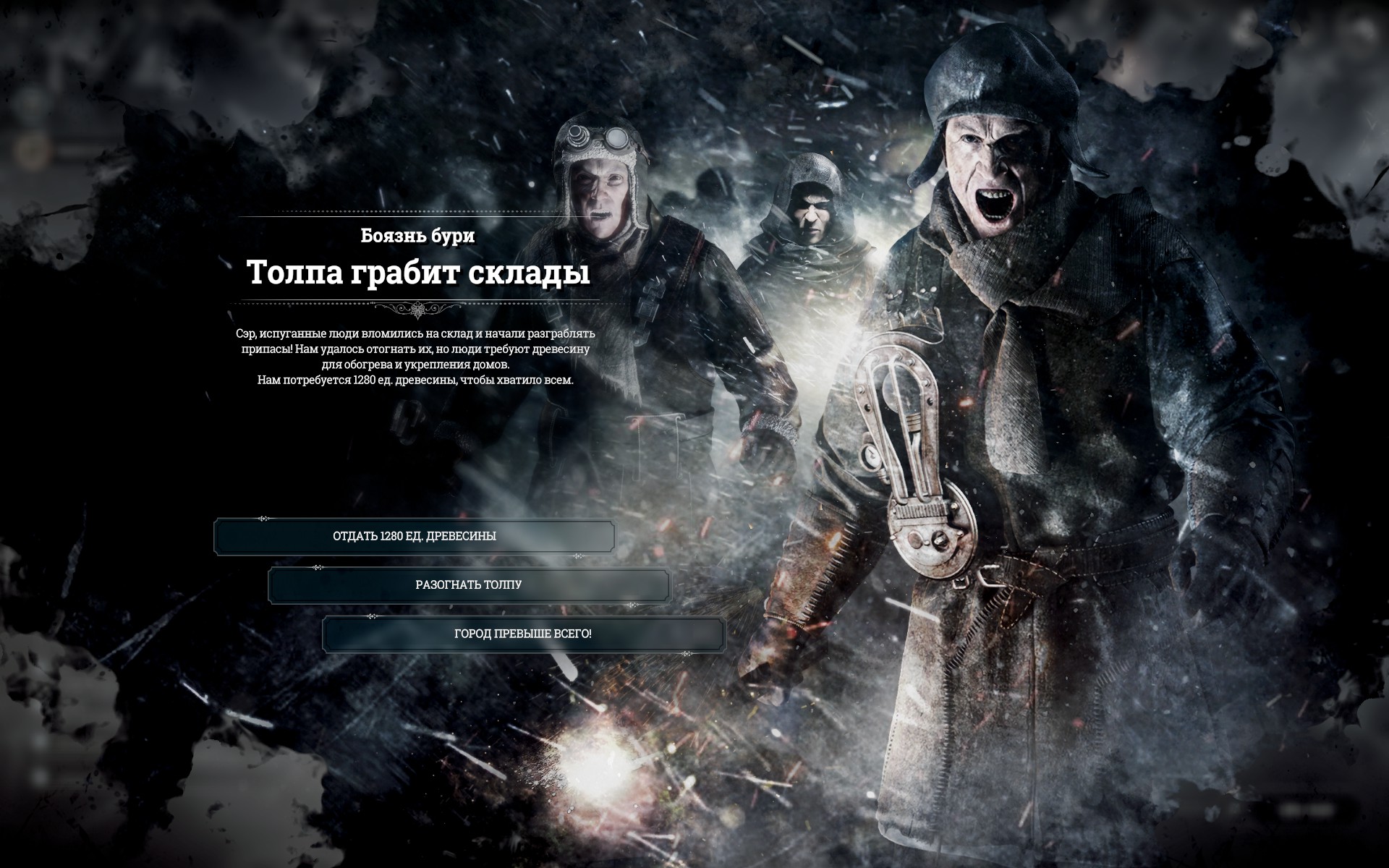
Spoiler

Actually, that's how it all happens. You build a city, choose what you are willing to do to survive in your particular situation, learn the small nuances of the game and learn to be effective. When you understand the game, you can take 3 more scenarios where the basic mechanics are quite strongly changed by the starting conditions or additional features of the game. For example, in the second scenario, you need to save the arks of flora, there is a story about the constant maintenance of temperature. The main moral choice is when it becomes clear that the neighboring settlement will not survive, you have to decide whether you will help him (without your help, they will die), or if you don’t risk it and use all the resources to protect the flora samples that will be needed after the Great Winter. If it ever ends.
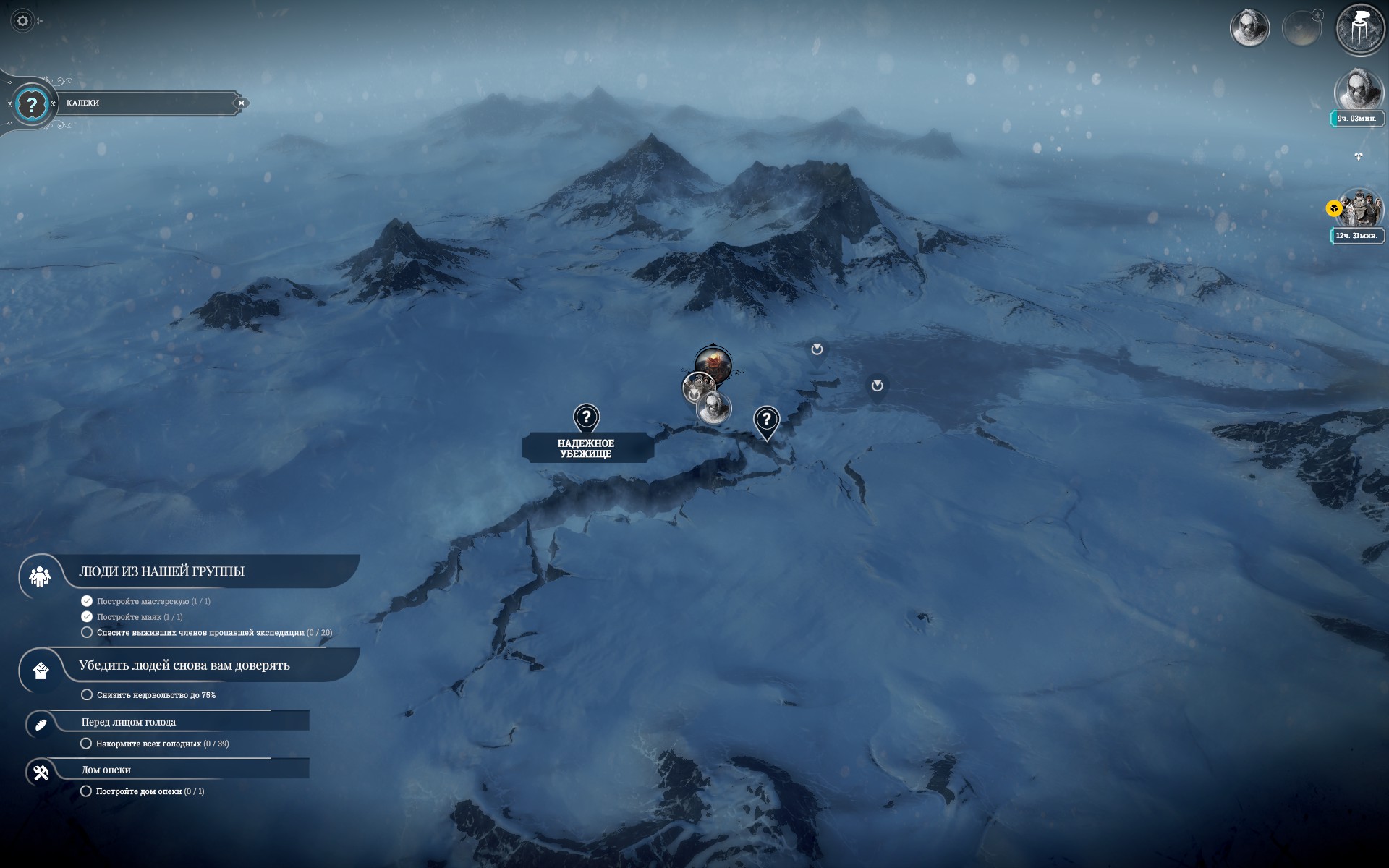
The best part of the game is intelligence. You move your scout squads around the map, and they come to the right points and examine them for something valuable and unowned. As a rule, there is also a moral and economic choice:
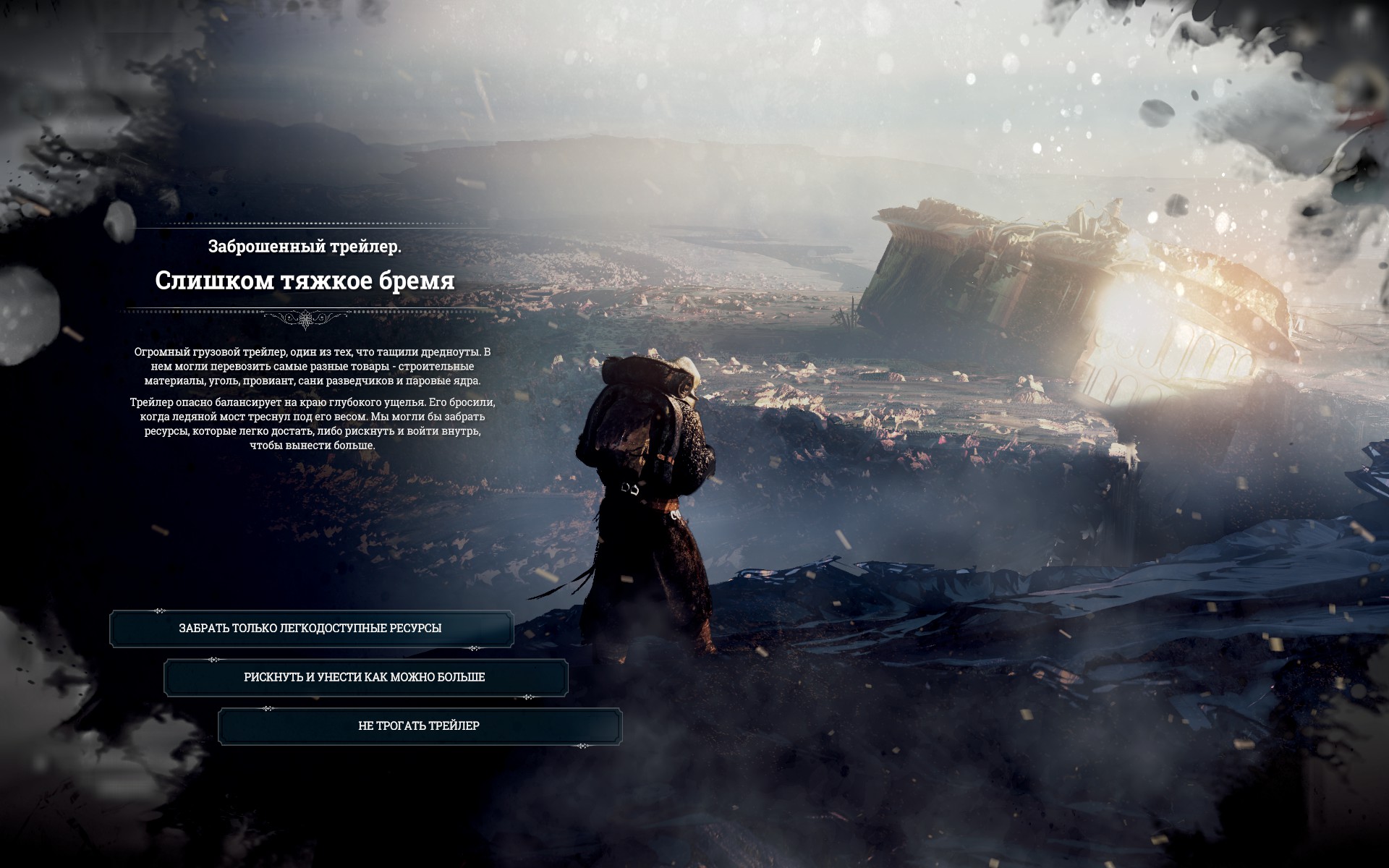
As in the best games, you understand the story as you go. Each find adds a small piece to the picture of the world. You can find out what happened to Teslagrad, you can look at the impressive dreadnought on which you arrived, you can try to understand why the mining outpost died, you can find a broken automaton and so on.
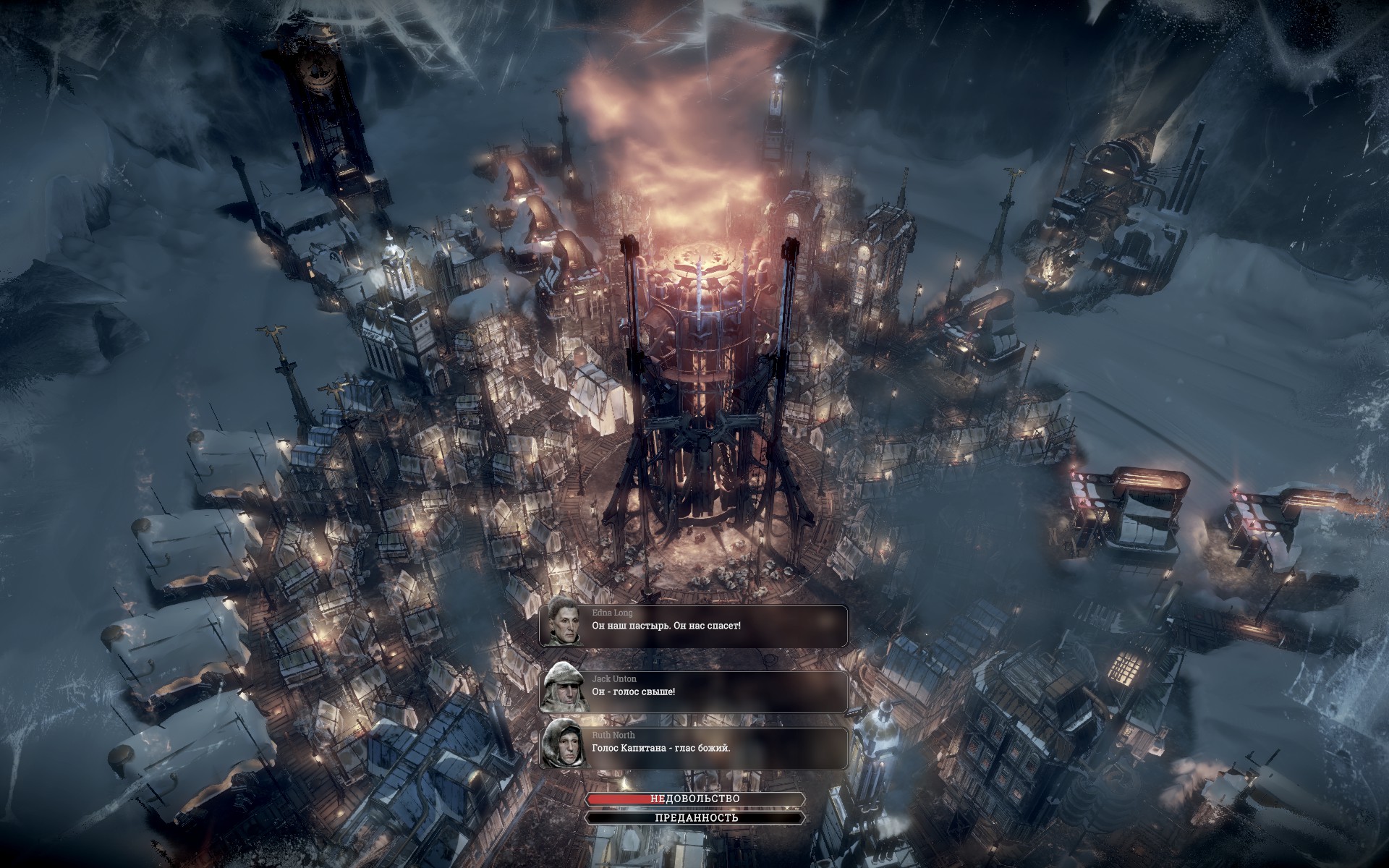
Residents respond to your choices.
A great story finding is that when you go through all the scenarios, questions will arise, and what happened around. And suddenly there are answers. The cards intersect, and you can see what happened and where, if you are careful. For example, the script of Winterhome explains in great detail what happened to the city. Are you wondering if people who went to the hot springs survived? Return to the “New Home” scenario and send the scouts there on time. You can catch freezing and dying people who can be saved.
In general, that part of the game, which is connected with the plot, the setting and the atmosphere, is simply beautiful to the point of madness. Therefore, we wanted a license for it, knowing what a tasty desktop we can do by attracting world-class authors. I think Vacarino (Dominion, Nefarius) and Escridge (Resistance) would definitely not refuse to work with her.
Problems in that part, which is about the economy. First, it’s as gloomy as in the best moments of This War of Mine. Only TWoM was a real world simulator where you were trained in the horrors of war. And Frostpank is a simulator of a fictional situation where you are most worried about your curvature. The fact is that the game has awesome strong positive feedback . This means that any mistake quickly unbalances the system and leads to a domino effect in the city.
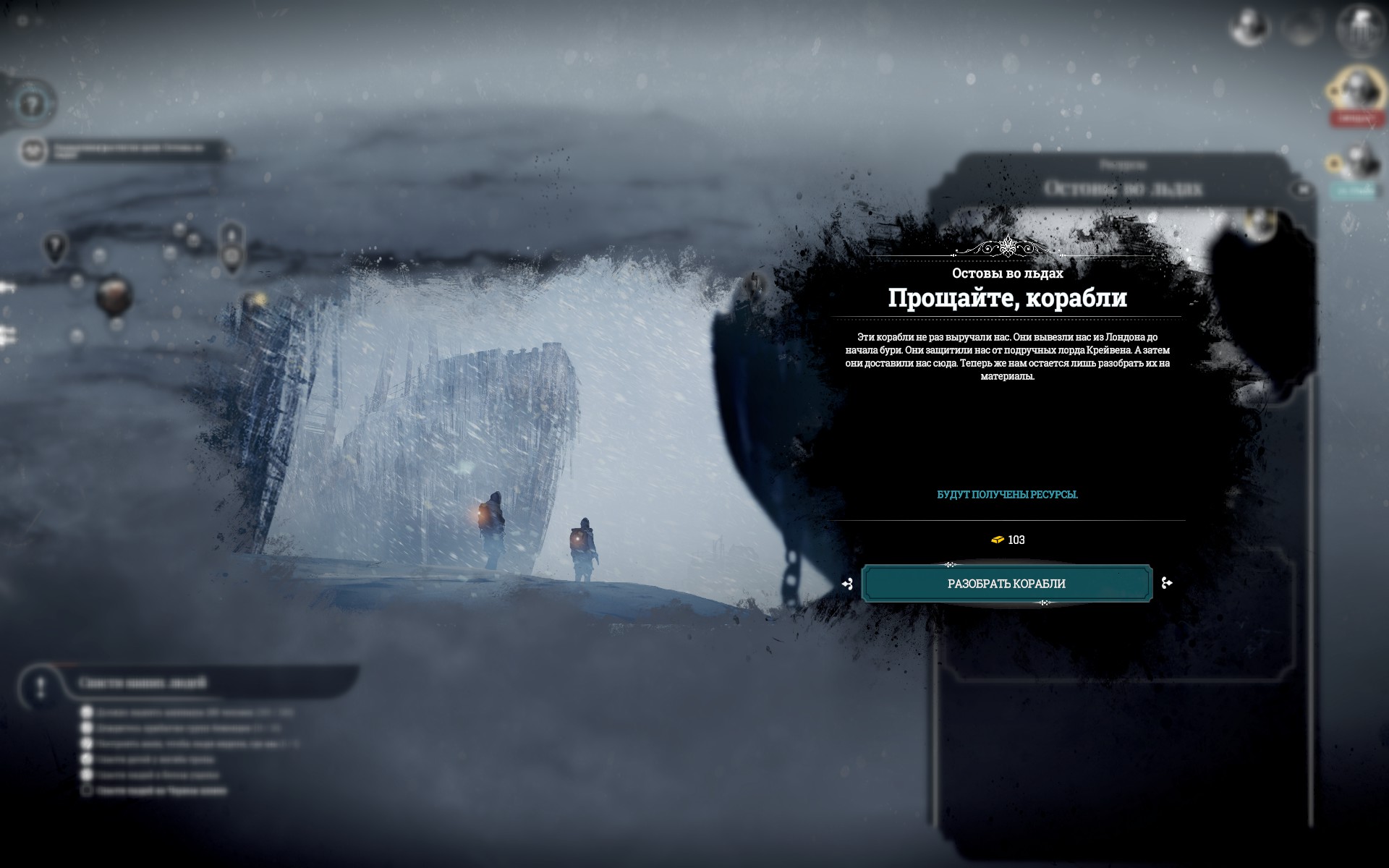
Training reminds discipline on sports save-hoad. The economy feels like a real crisis of 2016, when everything is in the ass, and you don't know what to grab. This is one of the few games where I needed a notebook for calculations and lining up the correct economic model. As it turned out, with a calculated economy, you can safely go into the complexity of "extreme".
I’ll say right away that I didn’t subscribe to play at work even during the holidays. Such sensations of the elections and the economy of the project is enough in real life. But all wildly drags the plot. For his sake, I learned how to build a city in an optimal sequence, and then enjoyed only the “elective” part of the game.

By the way, plus for the management peculiarity: it’s not really possible to accumulate something for the future, so you need to build the production balance, that is, only the mutual speed of resource receipt is important. On the complexity of "extreme" it is still important to take into account the speed of disposal of workers.
As in TWoM, sometimes something wonderful happens that changes mood:
Spoiler: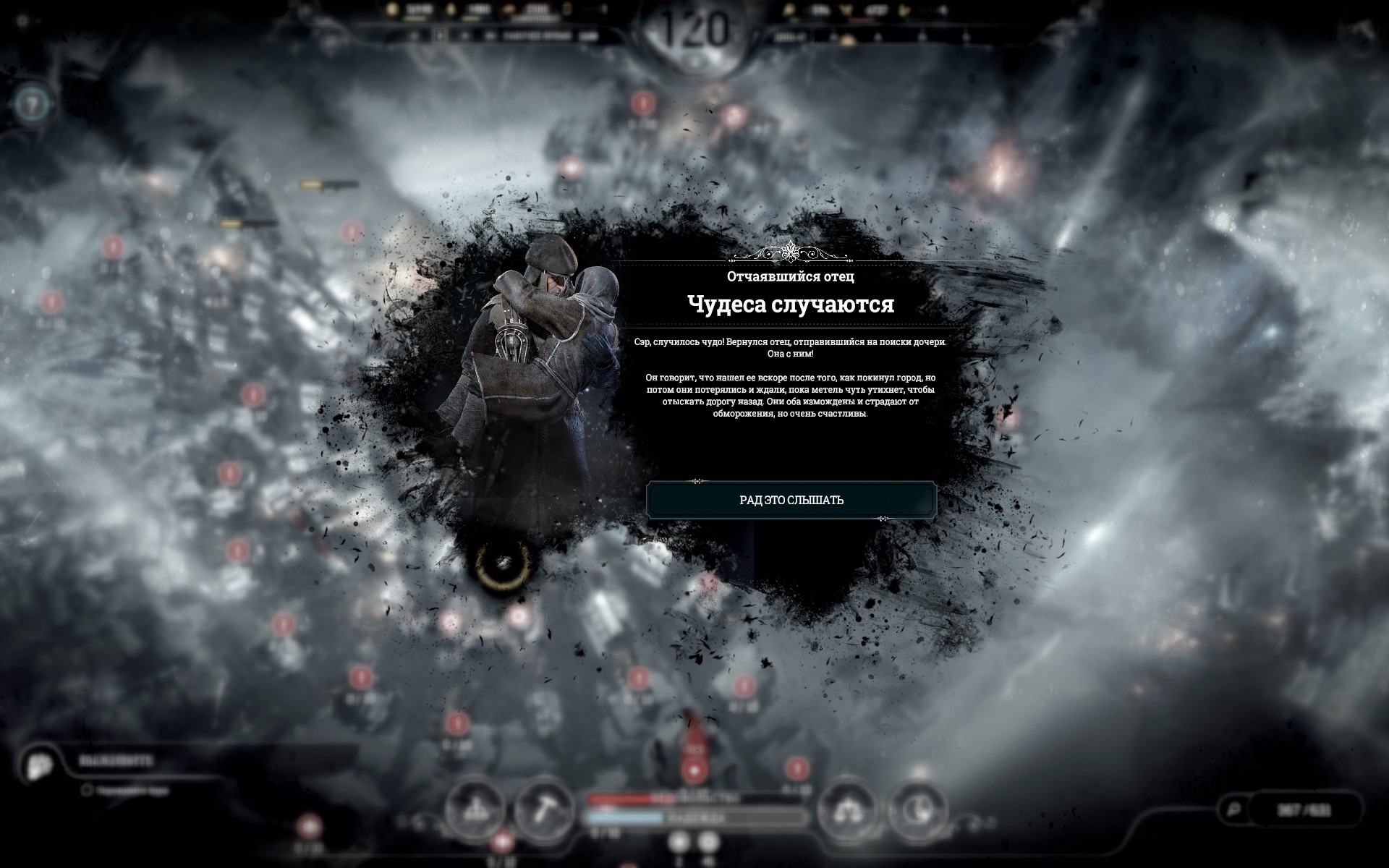

Why is the game world bad? Because there is no endorphins flow . Almost no respite. Imagine an RPG where, with each new level, your hero does less and less damage, and is forced to compensate for this by pumping skills. That is what you are playing in every game. It is simply not being presented as “you have become worse,” but as “the monsters have become stronger, the treasures are greater, and the prices have risen.” That is the same from the point of view of the model, just another wrapper. And this wrapper changes everything. In Frostpank, you are not getting better a little faster than the world around you, and the world around you gets worse a little bit faster than you.
Frostpank would be very good if he had not made high entry requirements. It is not clear why 11bit made a balance that almost did not forgive mistakes. Perhaps this is part of hardcore, and someone will like it. But in the same Factorio, there was also hardcore, but there was no such thing. There are a couple of logical inconsistencies, for example, the use of heaters and steam centers.
However, when everything collapses, there is not enough resources for anything and in general you want to start anew or run away from the game - this is how it fully pays off with the perfect completion of the script. You are shown your city from a bird's-eye view in a time-lapse: you can see how it developed. And they tell his short story, which includes the main important events and the opinion of the residents about them. In this case, the background music is very different from the style of passage.
For the sake of feeling “good” endings of scenarios, I want to return to the game a couple of extra times.
Everything else (except economy) is incredibly good. There are a lot of small finds from the warming in the interface (when the screen is fogging inside) before making a choice between different laws on the “metro map”. It is very wild that you decide how far you can go in the struggle for survival. And now, unlike TWoM, this is supported not only by the player’s sensations, but also by the mechanics. The attention to detail is tremendous: from how the triumph of faith in two pictures is shown to the signatures with the professions of people against the background of the main menu.
That's how the scene begins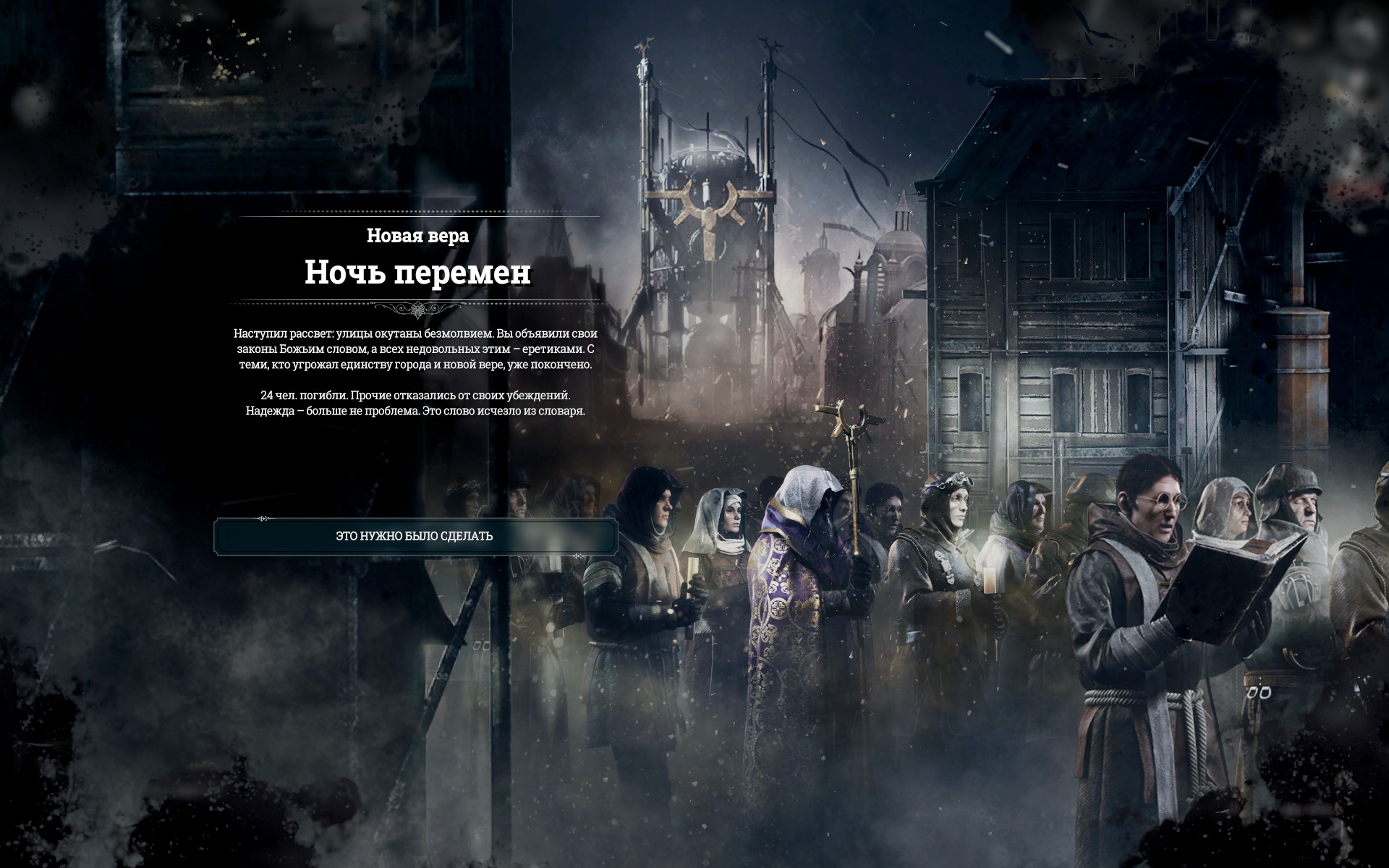

And so ends (spoiler)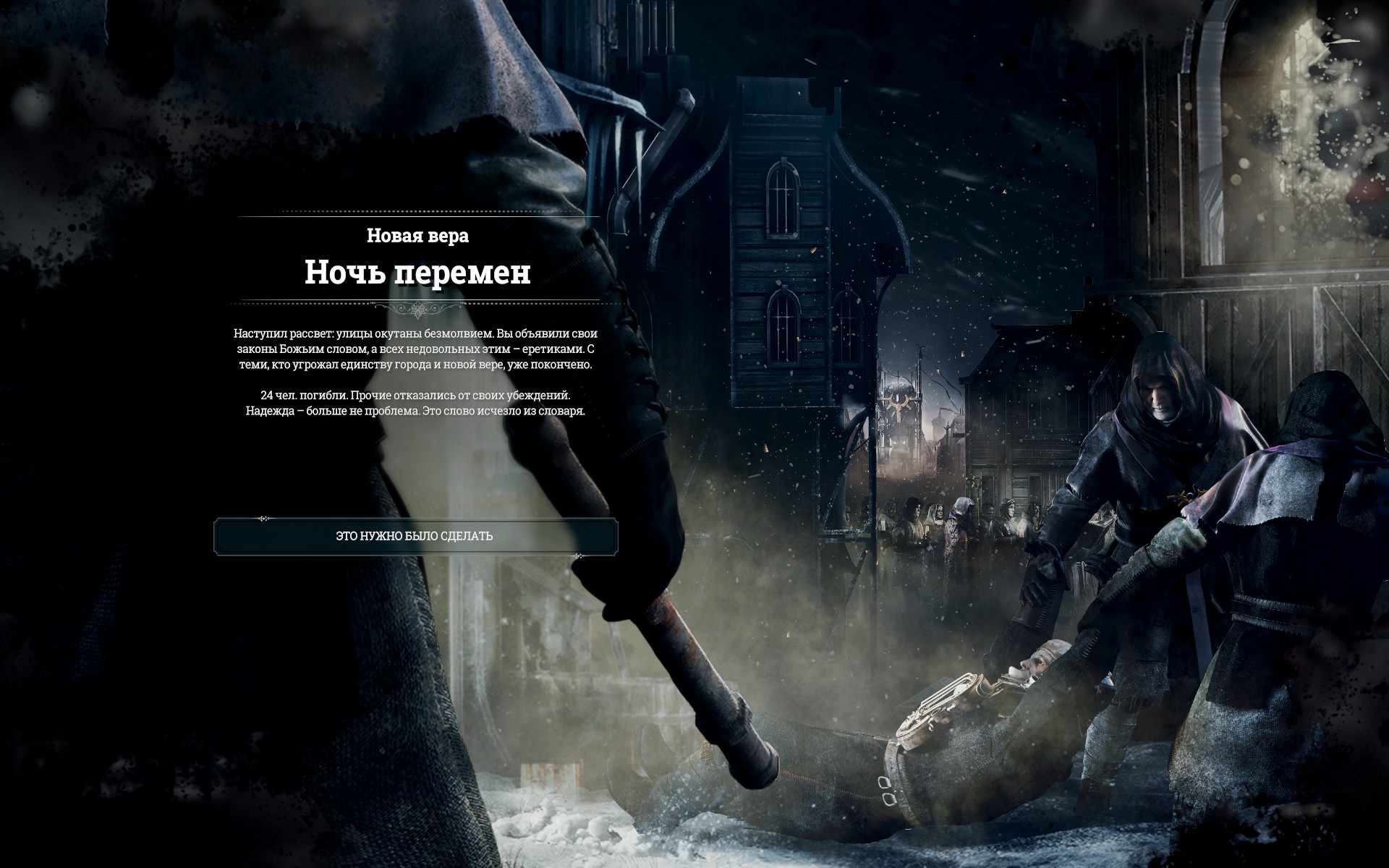

And, of course, this is a high-quality steampunk with the world, in which there is a good internal logic. Therefore - I recommend to all those who love the strange, and those who are engaged in the development of games. It is worth looking at Frostpank as a work of art, and not a piece with which you can play for a long time. He is like a good book that excites the imagination.
